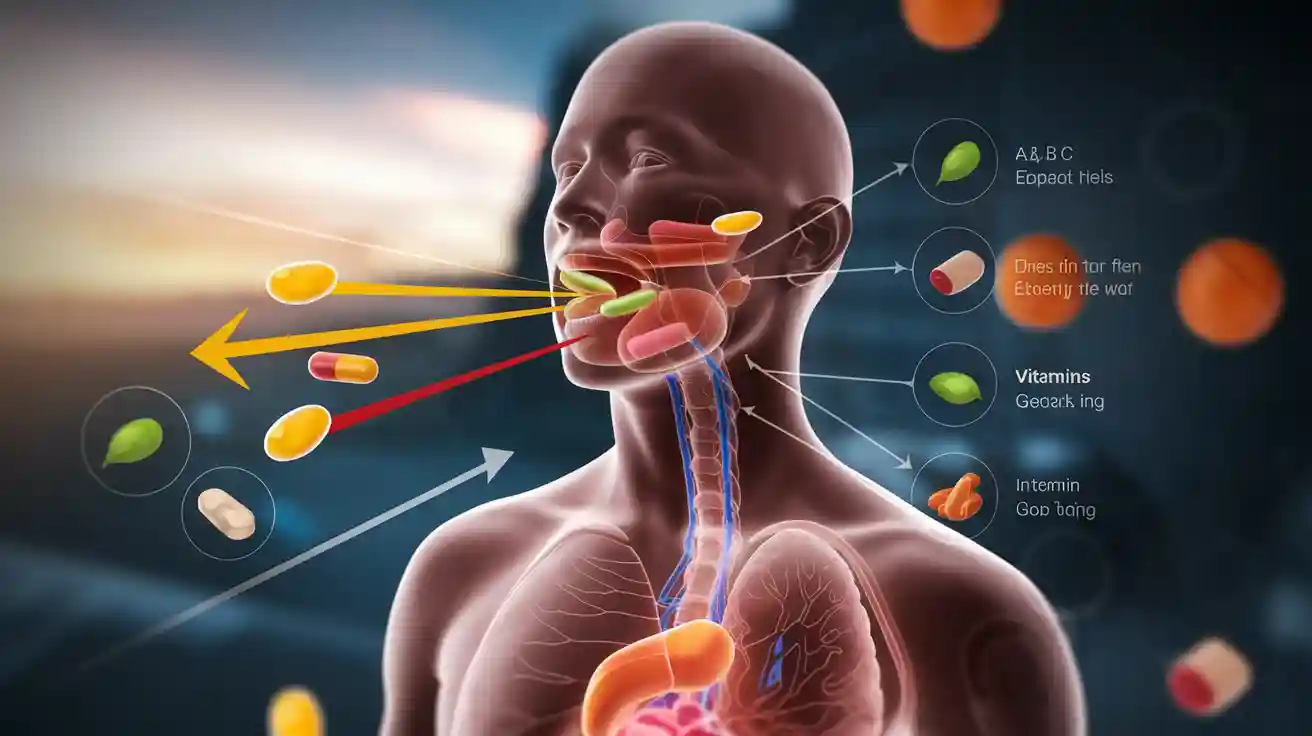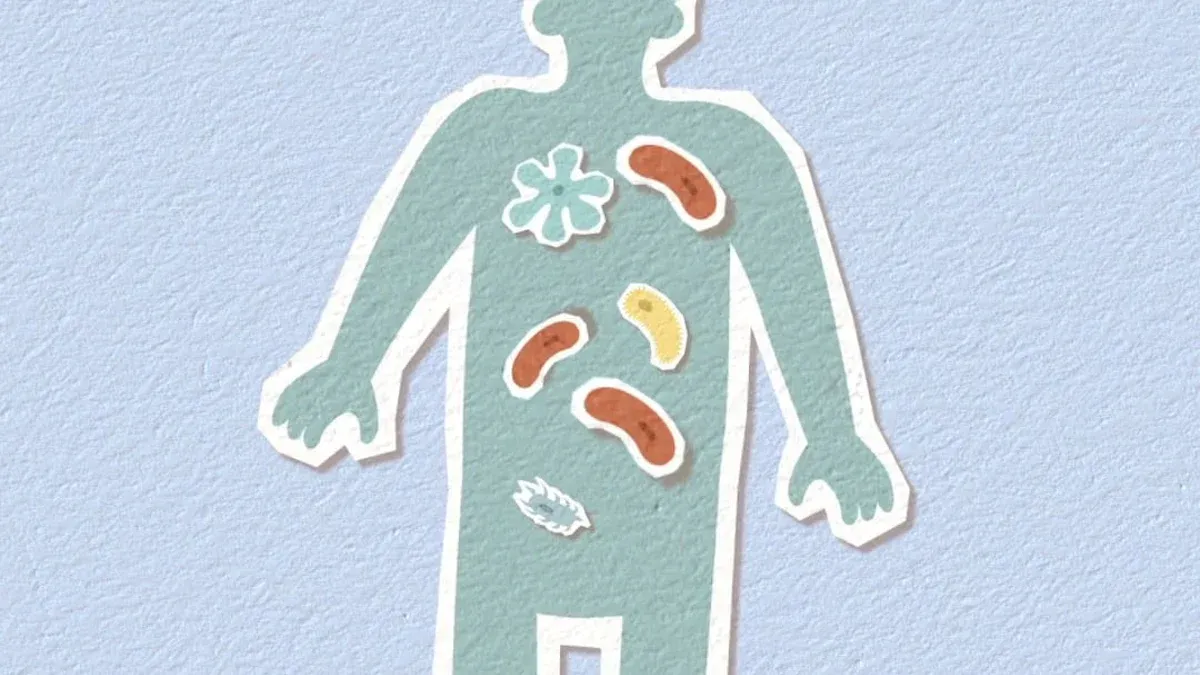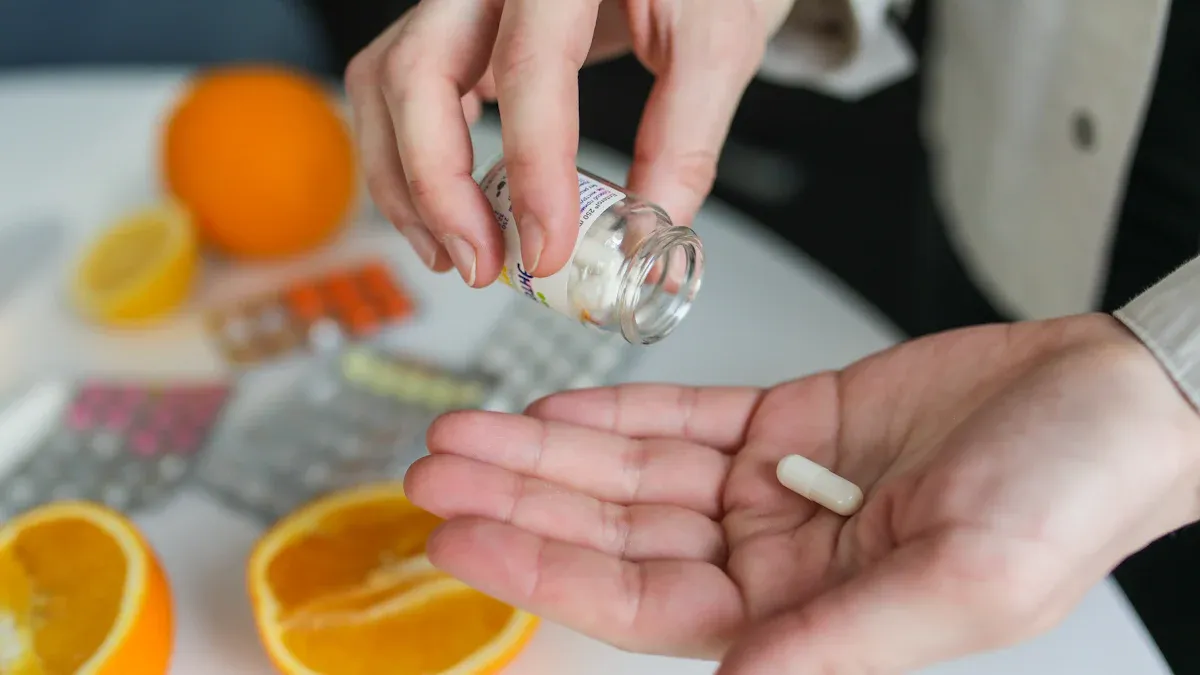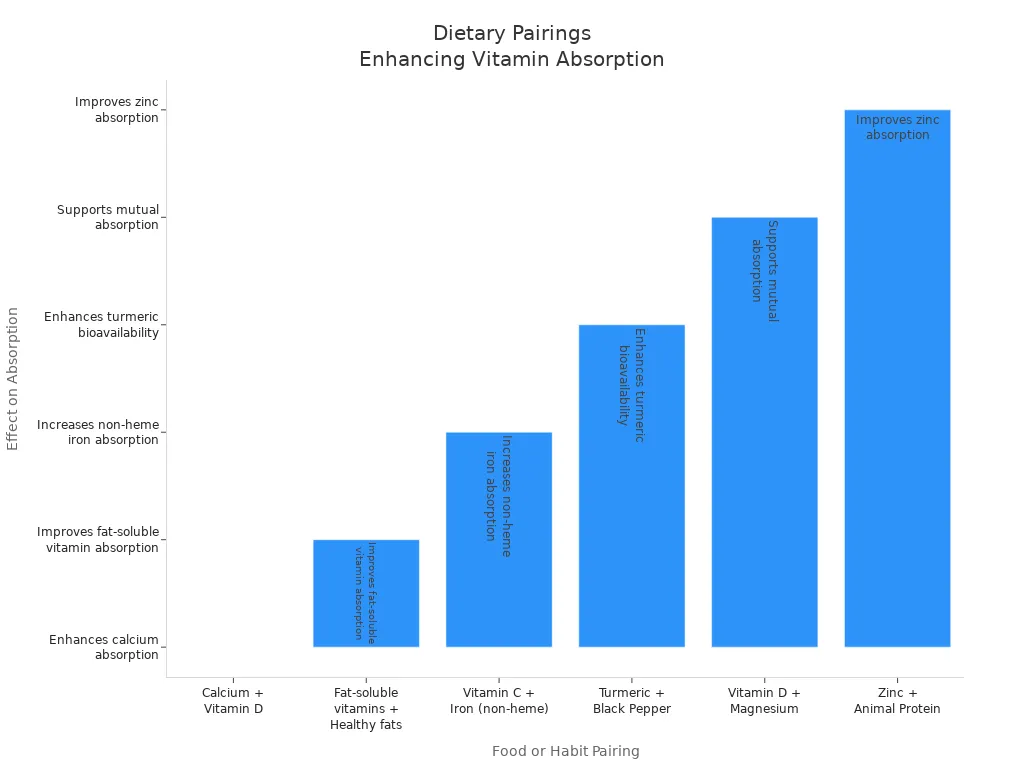How Quickly Vitamins Work in Your Body Explained
Table of Contents

You might notice the effects of some vitamins work quickly, sometimes within minutes or hours, while others take weeks or months for you to feel the full benefits of taking vitamins. The answer to how long does it take for vitamins to work depends on the type you take and your own body. Water-soluble and fat-soluble vitamins work differently inside you. Your overall health, how do vitamins work in your system, and your well-being all play important roles. If you wonder how long do vitamins take to work, remember that well-being improves over time when you use vitamins correctly.
Vitamins work best when you pay attention to your unique needs and habits.
How Long Does It Take Vitamins to Work?
You might wonder how long does it take vitamins to work after you start taking them. The answer depends on the type of vitamin, your health, and the way you take the vitamin. Some vitamins work quickly, while others take longer to show results. The absorption speed and delivery method play a big role in how fast you notice changes.
Fast-Acting Vitamins
Some vitamins act fast in your body. Water-soluble vitamins, like vitamin C and B vitamins, are absorbed quickly. When you take these vitamins, they enter your bloodstream within a few hours. You may feel a mild energy boost, better sleep, or improved digestion within 24 hours. Vitamin C can help your immune system, and you might notice this effect in one or two days. The way you take these vitamins also matters. If you use soft capsules or liquid forms, your body absorbs them faster than tablets or hard capsules. Soft capsules have the vitamin already dissolved, so your body does not need to break them down.
| Timeframe | Effects of Water-Soluble Vitamins (Vitamin C, B Vitamins) |
|---|---|
| Within 24 hours | Mild energy boost, better sleep, improved digestion, immune support |
| 1 week | More energy, better mood, improved digestion, less inflammation |
| 2 weeks | Healthier skin and nails, fewer deficiency symptoms, better energy processing |
Some vitamins, like vitamin K2, also act quickly because of their chemical structure. B vitamins help your body make energy right away. For example, vitamin B6 helps over 140 enzymes in your body. These enzymes help break down food and make energy. When you take a high dose of B vitamins or vitamin C, you might feel effects like more energy or better focus soon after.
The delivery method can make a big difference. IV vitamin therapy gives vitamins straight into your bloodstream. This method skips your stomach and intestines, so your body gets almost all the vitamin right away. People who get IV vitamin therapy often feel more hydrated, warmer, and more energetic within minutes. For example, IV vitamin C can reach much higher levels in your blood than when you take it by mouth. IV vitamin therapy is very fast, but most people use oral supplements for daily needs. Oral vitamins take longer to work because your body needs to digest and absorb them first.
Tip: If you need quick results, such as for a vitamin deficiency or medical reason, IV vitamin therapy can help you feel better faster. However, always talk to your doctor before starting any IV vitamin treatment.
Slow-Acting Vitamins
Some vitamins take longer to show results. Fat-soluble vitamins, like vitamin D and vitamin E, build up in your body over time. If you have a deficiency, you may need to take these vitamins for weeks or even months before you feel better. For example, research shows that vitamin D supplements can improve your health, but you might not notice changes for several weeks. In some studies, people with low vitamin D levels took supplements for 12 weeks or longer before seeing big improvements in their health.
- Multivitamins with many nutrients are also slow-acting. Studies show that taking a daily multivitamin can help your memory and thinking skills, but these benefits appear after two or three years.
- People with certain health problems, like lupus or heart failure, may need to take vitamin D for months before they see less inflammation or better symptoms.
- If you have a vitamin deficiency, you need to keep taking the vitamin until your blood levels reach normal. This process can take weeks or months, depending on how low your levels are.
The way your body absorbs and stores fat-soluble vitamins explains why they act slowly. Your body stores these vitamins in fat tissue and the liver. You need to build up enough of the vitamin before you feel the benefits. Long-term absorption is important for these vitamins. You may not feel better right away, but steady use helps your body heal over time.
Note: Correcting a vitamin deficiency is a gradual process. You may not feel better after the first dose. Keep taking your vitamins as directed, and check your blood levels with your doctor to track your progress.
You can see that how do vitamins work depends on the type, your health, and the delivery method. Fast-acting vitamins like vitamin C and B vitamins can give you quick results, especially with IV vitamin therapy. Slow-acting vitamins, like vitamin D, need time and steady use for you to feel the full benefits. If you wonder how long do vitamins take to work, remember that some effects are quick, but others require patience and regular use.
How Are Vitamins Absorbed?

Water-Soluble vs. Fat-Soluble
You absorb vitamins in different ways depending on their type. Water-soluble vitamins, such as vitamin C and B vitamins, dissolve in water. Your body absorbs these vitamins quickly. After you eat or take a supplement, water-soluble vitamins move through your digestive system and enter your bloodstream directly. This process allows for a fast vitamin absorption rate and quick nutrient utilization. You do not store these vitamins for long. Your body uses what it needs and removes the rest through urine.
Fat-soluble vitamins, including vitamins A, D, E, and K, need a different process. These vitamins dissolve in fat, not water. Your body requires dietary fat and bile acids to absorb them. Fat-soluble vitamins travel through the lymphatic system before reaching your bloodstream. You store these vitamins in your liver and fatty tissues, which supports long-term absorption and slower nutrient release.
| Vitamin Type | Absorption Pathway | Storage Location | Absorption Speed |
|---|---|---|---|
| Water-Soluble | Bloodstream (via villi) | Not stored | Fast |
| Fat-Soluble | Lymphatic system (via bile) | Liver, fatty tissue | Slow |
Tip: Eating healthy fats with your meal helps your body absorb fat-soluble vitamins better.
Absorption Process
How are vitamins absorbed in your body? The process starts when you chew food or swallow a supplement. Your mouth and stomach break down vitamins with enzymes and acids. In the small intestine, tiny villi increase the surface area for nutrient absorption. Water-soluble vitamins cross into your bloodstream through these villi. Fat-soluble vitamins need bile from your liver to break them down before absorption into the lymphatic system.
The form of your supplement changes the absorption rate. Liquids and powders often allow for faster initial absorption than pills. Capsules protect vitamins from stomach acid, while tablets may break down slowly. Liposomal and nanoparticle forms boost bioavailability and uptake by protecting vitamins during digestion. IV supplements skip the digestive system, giving you the highest vitamin absorption and fastest nutrient uptake, but you usually use oral forms for daily needs.
- Digestion begins in your mouth with chewing and saliva enzymes.
- Stomach acids and enzymes break down vitamins further.
- In the small intestine, enzymes and bile help with absorption.
- Water-soluble vitamins enter your bloodstream directly.
- Fat-soluble vitamins use bile and enter the lymphatic system.
- Your body transports vitamins to cells for nutrient absorption and utilization.
- Excess water-soluble vitamins leave your body in urine; fat-soluble vitamins stay stored.
Your gut health, supplement form, and timing all affect vitamin absorption rates. Choosing the right supplement and supporting your digestive system helps maximize bioavailability and nutrient absorption.
Factors Affecting Vitamin Absorption
Supplement Form and Dosage
You can boost vitamin absorption by choosing the right supplement form and dose. Capsules often absorb better than tablets because they dissolve in your small intestine, while tablets may break down slowly or contain binders that limit absorption. Liquids and powders may offer faster uptake, but they can degrade quickly in your stomach. Liposomal supplements wrap nutrients in fat-like structures, which improves bioavailability and cellular uptake. IV vitamin therapy delivers nutrients straight into your bloodstream, bypassing digestion and reaching almost 100% absorption. Oral supplements must pass through your digestive system, so absorption rates can drop to 20-50%. Dose size matters, too. Small doses of vitamin C (up to 200 mg) absorb almost fully, but higher doses lead to more excretion. Divided doses of thiamine and vitamin B12 improve absorption compared to taking a single large dose. Sustained-release forms do not always enhance absorption or nutrient uptake.
Tip: If you want rapid effects, IV vitamin therapy is the fastest delivery method, but oral supplements are more convenient for daily use.
Diet and Health
Your diet and health play a big role in nutrient absorption. Eating healthy fats with fat-soluble vitamins helps your body absorb them better. Foods rich in vitamin C, such as oranges and bell peppers, increase iron absorption by making it easier for your body to use. Some foods, like spinach and grains, contain oxalate and phytic acid, which can block absorption of minerals like magnesium and iron. Vitamin D helps your body absorb calcium, supporting strong bones. Health conditions can also affect absorption. Diseases like celiac, Crohn’s, and cystic fibrosis can lower absorption of vitamins A, D, E, K, C, and B12. Bariatric surgery and liver or kidney problems may reduce nutrient uptake and change your nutritional status.
| Vitamin | Health Conditions That Lower Absorption |
|---|---|
| Vitamin A | Fat malabsorption, liver disease, intestinal surgery |
| Vitamin D | Kidney failure, bowel disease, bariatric surgery |
| Vitamin E | Cystic fibrosis, pancreatic insufficiency |
| Vitamin K | Liver disease, GI disease, antibiotics |
| Vitamin C | Crohn’s, celiac, kidney failure |
| Vitamin B12 | Pernicious anemia, bariatric surgery |
Age and Lifestyle
Your age and lifestyle can change how well your body absorbs vitamins. Young people absorb nutrients easily because their stomach acid and gut bacteria work well. As you get older, your stomach acid drops and your gut lining thins, which lowers absorption of vitamins like B12, calcium, and vitamin D. Older adults may need to adjust their diet or supplement routine to maintain good nutrient absorption and nutritional status. Alcohol use can reduce vitamin A in your liver and block the conversion of beta-carotene to vitamin A. Smoking and alcohol also affect vitamin D and bone health. Staying active and eating a balanced diet help support nutrient uptake and absorption.
Note: If you have health issues or take medications, talk to your doctor about your vitamin absorption and supplement needs.
How to Tell If Vitamins Work
Physical Signs
You may wonder how you can tell if vitamins work for you. Sometimes, your body gives you clues through physical signs. When you have a vitamin deficiency, you might notice tiredness, weak muscles, or changes in your skin and hair. If you start taking the right vitamins, these symptoms can slowly improve. For example, better hand coordination, stronger balance, and less tingling in your hands or feet can show that your vitamin B12 levels are getting better. People with enough vitamin B12 often do better on hand dexterity tests than those with low levels.
Physical symptoms can help you spot changes in your vitamin status, but they are not always clear or specific. You may not see obvious signs if you only have a mild deficiency. Sometimes, you feel better in your energy or immune health before you notice any big changes in your body.
Keep in mind that physical signs are more reliable for spotting a deficiency than for showing improvement. You may feel a boost in well-being or immune support, but these feelings can come from many factors, not just vitamins.
- Signs that may improve with better vitamin status:
- More energy and less tiredness
- Improved mood and well-being
- Better immune response (fewer colds)
- Healthier skin, hair, and nails
Blood Tests
Blood tests give you a clearer picture of how vitamins work inside your body. Doctors use these tests to check your vitamin and mineral levels. You can test for vitamins like A, D, C, K, and B-complex, as well as minerals such as magnesium and zinc. These tests help you find out if you have a deficiency or if your levels are too high.
| Vitamin Test | What It Measures | How Soon Changes Show Up | Notes |
|---|---|---|---|
| Vitamin D (25(OH)D) | Long-term vitamin D status | 2-3 months after starting | Daily dosing keeps levels steady |
| Vitamin B12 | Blood and tissue B12 levels | Weeks to months | Symptoms may appear even with normal blood |
| Vitamin B6 (PLP) | Tissue stores of B6 | Days to weeks | Multiple tests give best results |
Blood tests can show changes in your vitamin D levels within a week, but the most accurate results come after 2-3 months. For vitamin B6, changes may appear in just a few days. However, no single test gives a complete answer. Doctors often use several tests and look at your symptoms and well-being to get the full picture. Some health conditions can affect test results, so your doctor may need to check more than one marker.
Tip: If you want to track your progress, ask your doctor about the best time to test your vitamin levels. Regular blood tests and attention to your well-being help you see how vitamins work for your body.
Maximize Vitamin Absorption

Best Practices
You can boost vitamin absorption by following a few simple steps. Take your multivitamin with food, especially meals that contain healthy fats or fiber. This helps your body absorb both water-soluble and fat-soluble vitamins. Split your vitamin C doses throughout the day. Your body uses what it needs and removes the rest, so smaller, frequent doses work better. Liposomal vitamin C supplements can improve absorption because they bypass some digestive barriers and reach your cells more easily. Buffered vitamin C is gentle on your stomach and works well for people with sensitivity.
If you use mineral supplements like calcium, zinc, or magnesium, space them out. Do not take calcium and iron together. Wait at least two hours between these minerals to avoid competition for absorption. Pair vitamin C with iron-rich plant foods to help your body absorb more iron. Steaming vegetables instead of boiling them keeps more water-soluble vitamins in your food. Support your gut health with probiotic drinks like kefir or kombucha. Good gut health helps your body absorb more nutrients from food and supplements.
Tip: If you want the fastest delivery, iv vitamin therapy gives nutrients directly to your bloodstream. This method skips digestion and can help people with absorption problems. Ask your doctor about iv vitamin options if you have trouble absorbing vitamins from food or pills.
Foods and Habits
Your food choices and daily habits play a big role in vitamin absorption. Eating fat-soluble vitamins like A, D, E, and K with healthy fats such as olive oil, nuts, or salmon helps your body absorb them better. Water-soluble vitamins like B and C absorb quickly, but your body does not store them. You need to eat these vitamins often.
| Vitamin or Nutrient Pairing | Dietary Habit or Food Combination | Effect on Absorption |
|---|---|---|
| Calcium + Vitamin D | Eat calcium-rich foods with vitamin D sources | Improves calcium absorption |
| Fat-soluble vitamins + Healthy fats | Eat with unsaturated fats | Boosts vitamin absorption |
| Vitamin C + Iron | Combine plant-based iron with vitamin C-rich foods | Increases iron absorption |
| Turmeric + Black Pepper | Add black pepper to turmeric dishes | Improves antioxidant absorption |
| Vitamin D + Magnesium | Eat magnesium-rich foods with vitamin D | Supports absorption and use |
| Zinc + Animal Protein | Pair zinc with animal protein | Improves zinc absorption |

Some habits can block vitamin absorption. Drinking tea or coffee with iron-rich meals can lower iron uptake. Stress, smoking, and some medicines can use up or block vitamins like A, C, and E. Very low-fat diets make it hard to absorb fat-soluble vitamins. Try to eat a balanced diet, manage stress, and get enough sleep. These habits help your body use every nutrient you take in. If you need quick results or have trouble with absorption, iv vitamin therapy may help you reach your health goals faster.
You now know that vitamins start working at different speeds, depending on their type and how your body absorbs them. Your small intestine plays a key role in this process, using enzymes and bile to help your body take in nutrients. To support your overall health and well-being, try these tips:
- Take vitamins with food to boost absorption.
- Eat healthy fats for fat-soluble vitamins.
- Watch for changes in your energy and mood.
- Ask your doctor for advice if you have health concerns.
Remember, a healthy digestive system helps your body get the most from vitamins.
FAQ
How long does it take to feel the effects of vitamins?
You may notice some vitamins working within hours. Others, like vitamin D, need weeks or months. Your body type and health can change how fast you feel results.
Should you take vitamins with food or on an empty stomach?
You should take most vitamins with food. Fat-soluble vitamins need healthy fats for better absorption. Water-soluble vitamins work best with a meal, but you can take them on an empty stomach if needed.
Can you take too many vitamins?
Yes, you can take too many. Too much vitamin A or D can harm your body. Always follow the recommended dose on the label or ask your doctor for advice.
Tip: Track your vitamin intake with a simple chart to avoid taking too much.
| Vitamin | Safe Daily Limit | Signs of Too Much |
|---|---|---|
| Vitamin A | 3,000 mcg | Headache, nausea |
| Vitamin D | 4,000 IU | Weakness, confusion |
Do vitamins work the same for everyone?
No, vitamins work differently for each person. Your age, diet, and health affect how your body uses vitamins. You may need more or less than someone else.
What is the best time of day to take vitamins?
You can take vitamins in the morning or with your largest meal. This helps your body absorb them better. Try to take them at the same time each day for best results.

Poseidon
Master of Nutritional Epidemiology, University of Copenhagen, Herbal Functional Nutrition Researcher
Focus: The scientific application of natural active ingredients such as Tongo Ali, Horny Goat Weed, and Maca to sexual health and metabolic regulation.
Core Focus:
Men: Use a combination of Tongo Ali (an energizing factor) + Maca (an energy reserve) to improve low energy and fluctuating libido.
Women: Use a combination of Horny Goat Weed (a gentle regulator) + Maca (a nutritional synergist) to alleviate low libido and hormonal imbalances.
Stressed/Middle-Aged Adults: This triple-ingredient synergy supports metabolism, physical strength, and intimacy.
Product Concept:
Based on traditional applications and modern research (e.g., Tongo Ali promotes testosterone-enhancing enzyme activity, and icariin provides gentle regulation), we preserve core active ingredients and eschew conceptual packaging—using natural ingredients to address specific needs.
Simply put: I'm a nutritionist who understands "herbal actives." I use scientifically proven ingredients like Tongo Ali, Epimedium, and Maca to help you make "sexual health" and "nutritional support" a daily routine.
